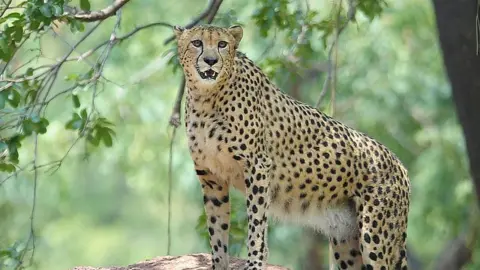Indian man who fed water to cheetahs in viral video restored in job
 Getty Images
Getty ImagesAn Indian forest worker, who was suspended after he was seen offering water to a cheetah and her cubs in a viral video, has been restored in his job at the sanctuary.
Satyanarayan Gurjar, a driver at the Kuno National Park in Madhya Pradesh state, violated instructions which said only authorised personnel could go near the big cats.
Cheetahs became extinct in India in 1952 but they were reintroduced in Kuno in 2022 as part of an ambitious plan to repopulate the species.
"I was suspended but have now been reinstated," Mr Gurjar told BBC Hindi. "I am thankful to the authorities," he said, adding that the region's top forest official was incensed at his act.
Forest officials confirmed his reinstatement after protests by members of his community. Since this was his first offence, forest officials said they let him go with a warning, telling him that if he encountered an animal in distress in future, he should contact the authorities and not intervene himself.
The viral footage surfaced on Sunday with a video showing him pouring water into a metal pan, urged by off-camera voices. Moments later, a cheetah called Jwala and her four cubs drink from it.
Mr Gurjar said he was not at fault and blamed those who made the videos viral.
Referring to the cheetah and her cubs in the video, he said, "I called her by her name, saying 'Jwala come, Jwala come'. They come only when you call them by their names."
While initial reports called the video "heart-warming" and praised Mr Gurjar for his "kindness" and "bravery", many on social media raised safety concerns and urged authorities to create water sources within the park to prevent such encounters.
Mr Gurjar says he isn't afraid of wild animals as his ancestors have lived in forests for generations.
"I can sense the feelings of 99% of animals just by looking at them. I could immediately sense that the cheetah and her cubs were thirsty and I offered them water," he said.
Officials say staff sometimes offer water to big cats near park boundaries to lure them back into the forest.
Chief Conservator of Forests Uttam Kumar Sharma said earlier that only trained personnel wre allowed near cheetahs to guide them back and avoid conflict. The man's actions violated protocol, which clearly instructs staff to keep their distance, he added.
Mr Gurjar also has some advice about what to do if you encounter a big cat. "If you ever face a cheetah, speak to it with love - don't hit it or throw stones," he said.
Between 2022 and 2023, 20 cheetahs were relocated from South Africa and Namibia to Kuno - the first intercontinental move of its kind.
Since then, eight have died from causes like kidney failure and mating injuries, raising concerns about the park's suitability.
Park authorities deny the allegations, saying 26 cheetahs remain -17 in the wild and nine in enclosures.
India is expected to receive 20 more from South Africa this year.
